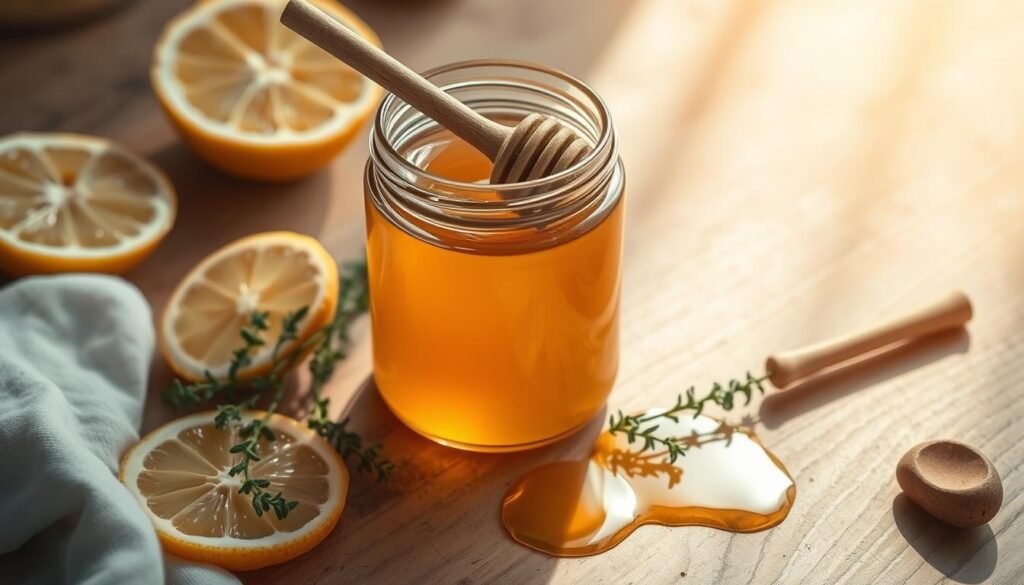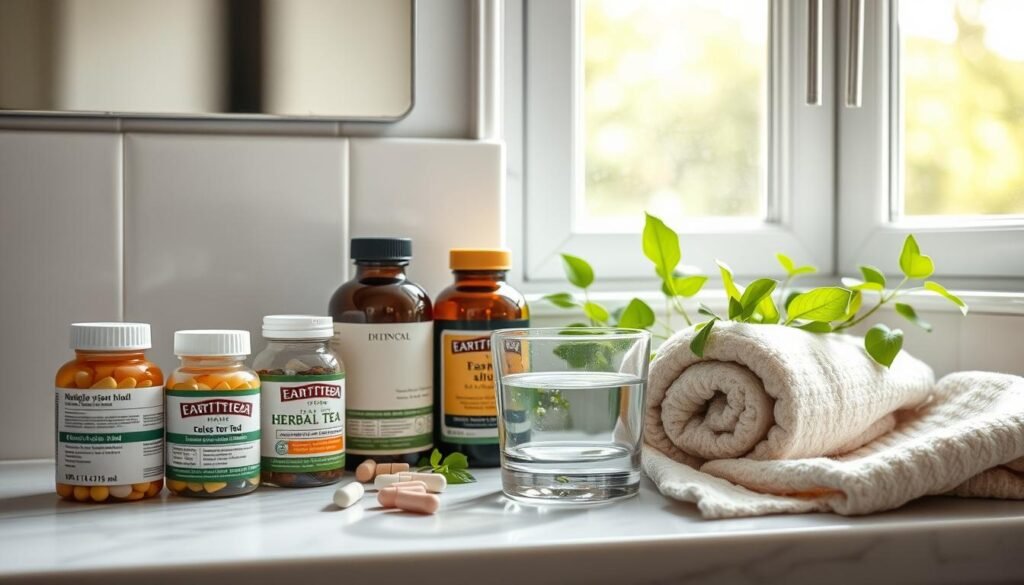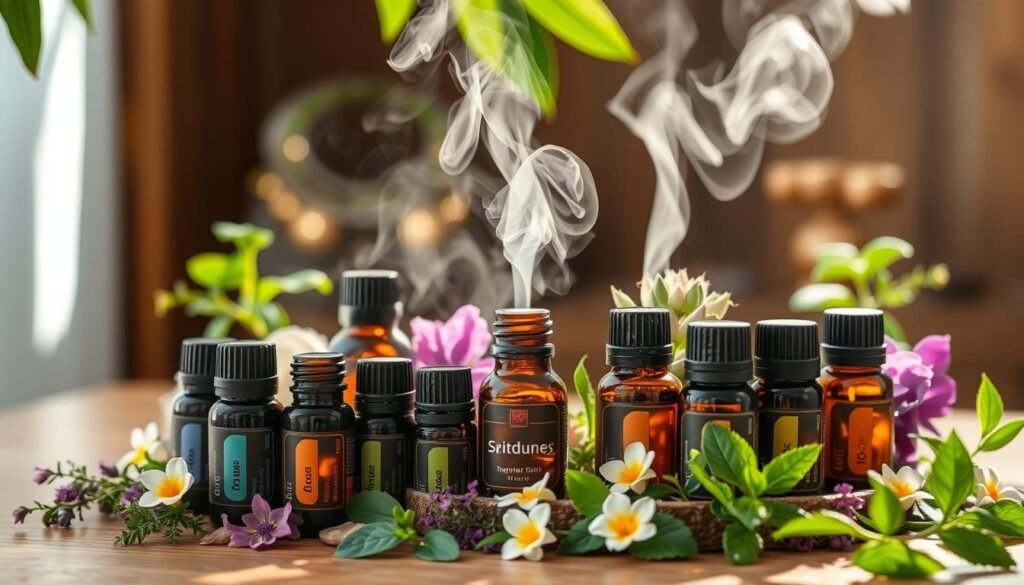Do you know the average doctor’s visit in the US costs between $300 and $600? This makes natural relief more attractive. These include rest, drinking water, and using over-the-counter (OTC) medicine. They can’t cure a cold but can help with symptoms and health recovery.
Self-care, like good rest and drinking enough water, helps fight infections. Also, learning about OTC remedies is useful. Items like acetaminophen and ibuprofen can lessen pain. These methods let people manage their health without prescription meds. For more help, see cold remedies for recovery tips.
Key Takeaways
- Rest is key for the immune system when sick.
- Staying hydrated is critical for health and easing symptoms.
- Over-the-counter remedies help in reducing discomfort and aid recovery.
- Self-care is important in fighting colds and flu.
- Natural remedies can save money on costly doctor visits.
- It’s crucial to know when to see a doctor for safety.
The Importance of Rest in Recovery
Rest is key in recovery, especially with upper respiratory infections. Fighting these infections requires good sleep. It strengthens immune function. Most upper respiratory infections clear up in one to two weeks. During this period, making rest and hydration a priority is crucial for health.
How Sleep Affects Immune Function
Sleep greatly boosts immune function. The body makes cytokines during rest. These proteins help battle infections and inflammation. Enough rest can speed up illness recovery. It also prevents worse conditions, such as pneumonia, especially in the elderly or those with weak immune systems.
Tips for Better Sleep When Sick
Better sleep can help you recover faster. Here are some tips for a good night’s rest:
- Have a regular bedtime routine to prepare for sleep.
- Keep your bedroom dark and quiet. Use white noise machines if needed.
- Steer clear of caffeine and alcohol before bed. They can mess with sleep and dry you out.
- Try deep breathing or stretching before bed to relax.
Understanding the role of rest in recovery is vital. It promotes a comprehensive view of health, improving healing effectiveness.
Hydration: Key to Health and Recovery
Staying hydrated is very important when you’re sick or recovering. Your body needs more fluids to keep working right and avoid dehydration. Knowing how much to drink helps you make smart choices for your recovery.
Fluid Needs During Illness
When you’re sick or very active, you need to drink plenty of fluids. Here’s what experts suggest:
- 16 to 20 ounces of fluids one to two hours before outdoor activities.
- Six to 12 ounces of fluid every 10 to 15 minutes during exercise.
- 16 to 24 ounces after physical exertion to replace lost fluids.
How much water you need can depend on your age, weight, and how active you are. Even though eight glasses a day is a good rule, everyone’s different. If you have health issues like diabetes or heart disease, your needs might change too.
Best Hydration Sources
Choosing the right drinks is key to good hydration. For light activities, water is the best. For intense workouts longer than an hour, sports drinks can help. They have electrolytes and carbs to help you recover. Here are some great options for staying hydrated:
- Water: Best for overall hydration.
- Broths: Provide hydration along with minerals.
- Electrolyte-rich drinks: Support recovery during intense physical activity.
- Warm lemon water and herbal teas: Soothing options that aid overall hydration.
Avoid drinks like alcohol or caffeine to stay hydrated. Although fruit juices are tasty, they often have too much sugar and not enough salt. Picking the right drinks is crucial for your recovery and health.
Natural Foods for Symptom Relief
Adding natural foods to your diet can really help when you’re sick. Chicken soup and ginger tea are great for this. They’re not just comforting. They also boost your immune system and ease pain.
Chicken Soup: A Time-Honored Remedy
For many years, people have loved chicken soup for its comfort. It’s great for staying hydrated and well-fed, especially if you have the flu or a cold. Chicken soup has chicken, veggies, and broth. These give you protein and vitamins you need. Plus, its warmth helps open your breathing.
Ginger Tea for Soothing Symptoms
Ginger tea is amazing for fighting inflammation and making you feel better. It’s perfect for sore throats and upset stomachs. Drinking it warm can be really comforting when you’re sick and don’t feel like eating much. To make ginger tea, just steep fresh ginger in hot water. This makes it tasty and full of health benefits. Drinking ginger tea often can really help with your symptoms and keep you healthy.
| Natural Food | Benefits | Preparation Tips |
|---|---|---|
| Chicken Soup | Hydrates, nourishes, and acts as a natural decongestant. | Use a variety of vegetables and herbs for added nutrients. |
| Ginger Tea | Reduces inflammation, soothes sore throats, and alleviates nausea. | Steep fresh ginger slices for a robust flavor. |
Honey as a Natural Cough Suppressant
Honey is known for its ability to soothe coughs. Studies show it offers throat relief and reduces coughing at night for kids. A 2010 study found that it provided more relief than some cough medicines.
How Honey Works in Throat Relief
Honey coats the throat and eases irritation right away. It’s even more effective when mixed with warm drinks. A 2012 study confirmed that eucalyptus and citrus honey types are better than placebos at lessening coughs. Plus, it’s safe for kids over a year old.

Precautions When Using Honey
Honey is good for you, but you have to use it wisely. The American Heart Association advises to not have more than 6 teaspoons a day. And never give it to babies under 12 months, because of a risk called botulism.
For throat comfort and cough control, consider safe natural options. Herbal teas with honey and lemon may help with symptoms from colds or allergies. To find out more about natural cough solutions, read this article.
| Study | Finding |
|---|---|
| 2010 Study | Honey provided more relief for coughs compared to dextromethorphan. |
| 2012 Study | Eucalyptus and citrus honey reduced cough severity better than a placebo. |
| Sleep Benefits | Honey helped improve nighttime sleep for children affected by coughs. |
Garlic and Its Immune-Boosting Properties
Garlic is well-known for its health perks, especially in boosting immunity. People often add garlic to meals in cold seasons for its taste and health benefits. The key component, allicin, is crucial for these advantages. It helps the body fight off illnesses.
Why Garlic is Beneficial for Colds
Eating garlic can make colds less severe. Garlic is great in cold remedies for several reasons:
- Antiviral Properties: Garlic fights off viruses, aiding in battling colds.
- Anti-Inflammatory Effects: Studies show that garlic oil reduces inflammation, common in colds.
- Immune System Support: Garlic boosts the immune system, making the body better at fighting infections.
- Antibacterial Benefits: Garlic’s antibacterial effects help battle illness-causing bacteria.
Adding garlic to your food is not only tasty but also boosts your immunity. Whether you prefer it raw or cooked, it makes dishes delicious and supports your health.
Over-the-Counter Remedies for Common Ailments
Over-the-counter remedies can greatly help with colds, allergies, and flu symptoms. Knowing how decongestants, antihistamines, and pain relievers work lets people pick the best treatment. It’s crucial to follow dosage guidelines, especially for kids, to use them safely.
Understanding Decongestants and Antihistamines
Decongestants like pseudoephedrine help clear nasal congestion by shrinking blood vessels in the nose. They come in pills or nasal sprays. However, don’t use nasal sprays for more than three days to avoid further irritation.
Antihistamines, such as cetirizine, fexofenadine, and loratadine, ease allergy symptoms without making you sleepy. Older antihistamines can cause drowsiness and dryness, posing issues for asthma sufferers by thickening mucus.
Using Pain Relievers Safely
Pain relievers like acetaminophen, ibuprofen, and naproxen reduce fever and pain. While effective, mixing them with alcohol can increase tiredness and reduce alertness. People with high blood pressure should stay away from decongestants to avoid risking their heart health.
Taking medicines with the same active ingredients can dangerously overdose, especially with acetaminophen, risking serious liver damage. Always talk to a doctor for advice on over-the-counter treatments for your specific needs.

| Medication | Type | Key Function | Considerations |
|---|---|---|---|
| Pseudoephedrine | Decongestant | Reduces nasal congestion | Watch for possible misuse; avoid if pregnant or with certain health conditions |
| Cetirizine | Antihistamine | Relieves allergy symptoms | Less likely to cause drowsiness |
| Dextromethorphan | Cough Suppressant | Reduces coughing | Use as directed; potential for abuse |
| Acetaminophen | Pain Reliever | Alleviates pain and fever | Do not exceed recommended dosage |
The Role of Rest, Hydration, and Over-the-Counter Remedies
Getting better from being sick involves a focused approach. It’s important to rest, stay hydrated, and use OTC remedies wisely. Our bodies need to rest to recharge. Experts suggest sleeping 8 to 10 hours for the best immune system health. This sleep is key for fighting off sickness.
Staying hydrated is also a major part of recovering. When we’re sick, we need more fluids. Drinking lots of water and electrolyte drinks helps our bodies. Dr. Zuberi says Pedialyte is better than Gatorade for keeping our electrolyte levels up. This is especially good for those getting over an illness.
OTC remedies help with symptoms. They won’t cure you, but they can make you feel better. Remember, kids under six need a doctor’s advice to use these meds. Also, see a doctor if symptoms last more than two weeks or get worse. This might mean you need a different treatment.
Not all supplements work the same way. For example, vitamin C might help shorten a cold but doesn’t cure it. While some say Zinc fights viruses, there’s not much proof. So, choosing what to take can be tricky.
Sometimes, old remedies help, like using apple cider vinegar for a sore throat. This shows how traditional and modern health tips can work together.
Home Remedies to Enhance Your Recovery
Home remedies are a useful option for quick relief from common illness symptoms. Using simple methods like salt water gargles and saline nasal irrigation can help you feel better. They make recovery smoother and more comfortable.
Salt Water Gargles for Sore Throats
Salt water gargles are a great way to ease sore throats. Dissolve salt into warm water and gargle it. This reduces swelling and discomfort.
The saline solution cleans out irritants and eases pain. Just mix a teaspoon of salt in warm water and gargle a few times daily. Warm salt water has been proven to reduce swelling and speed up healing.
Saline Nasal Irrigation Techniques
Saline nasal irrigation is great for fighting nasal congestion. It flushes the nasal passages with saline to remove mucus and allergens. Use boiled and cooled water or sterile saline to avoid infections.
To do it, you can use a neti pot or a squeeze bottle. Here are the steps for safe use:
- Prepare a saline solution with distilled or boiled water and salt.
- Lean over a sink and tilt your head sideways.
- Pour the saline into the upper nostril.
- Let it drain from the lower nostril, then switch sides.
These home remedies can greatly speed up recovery and ease symptoms. They maintain good health. For more ways to fight fatigue and boost adrenal health, check out natural remedies.
The Benefits of Humidity in Relieving Symptoms
Humidity is key for easing breathing problems. It helps those with respiratory issues feel better. The right humidity level is between 30-50% RH. This range can lower issues like sore throats, nosebleeds, and bronchitis. Dry air often makes colds and flu worse. Humidifiers add moisture to the air. This makes it easier to breathe and calms irritated air passages.
Humidifiers are great for kids with allergies or asthma. They ensure the air is moist enough for easy breathing. This can boost their comfort and help their lungs stay healthy. Yet, too much moisture isn’t good. Dehumidifiers keep mold and dust mites in check by removing extra moisture. This helps keep the air clean.
Air purifiers are important, too. They get rid of harmful particles in the air. These devices catch particles, even those as small as 2.5 micrometers. This helps avoid serious breathing problems. Using air purifiers with humidifiers and dehumidifiers creates a better environment for those with respiratory issues.
Dry air can damage the cells in our respiratory system. It can also slow down the flow of mucus. This shows how crucial humidity is for our lungs. Even during medical procedures that use general anesthesia, humidity matters. Different parts of our airway need specific humidity levels. For example, the nose or mouth needs 50% RH, while the lower throat needs 95% RH.
It’s clear that the right humidity levels are essential for good lung health. They really help with symptom relief for many people. For more details on how humidity affects lung health, there are studies available. You can find some of them here.
| Humidity Level | Recommended Relative Humidity | Effects |
|---|---|---|
| Nose or Mouth | 50% RH | Comfortable breathing and mucous function |
| Hypopharynx | 95% RH | Optimal mucous flow and respiratory function |
| Midtrachea | 100% RH | Essential for gas delivery and clearance |
Essential Oils and Their Therapeutic Effects
Essential oils are popular for their healing powers, especially for colds. These plant extracts can reduce discomfort and help relax. People often choose them over traditional medicine during the cold and flu season.
Commonly Used Essential Oils
Here are some top essential oils for health:
- Lavender oil: It calms you down and eases pain and swelling. It’s great for cold symptoms.
- Eucalyptus oil: This oil cools and soothes muscles, reducing pain. It helps with colds.
- Rosemary oil: Known for pain and inflammation relief, rosemary is good for symptom care.
- Arnica oil: This is recommended for lessening inflammation, bruising, and swelling. It’s perfect for discomfort.
When using essential oils, mix 6 teaspoons of a carrier oil with 15 drops of essential oil. This prevents skin irritation.

Diluted essential oils can be applied in compresses for pain, swelling, and inflammation relief. Do a skin test before using them. Remember, do not ingest essential oils. Use them in diffusers or apply them to your skin.
Essential oils are a big deal in America, with spending over $30.2 billion a year. Aromatherapy is becoming more popular worldwide, expected to hit a $5 trillion market by 2050. Nurses and healthcare theorists praise essential oils for managing symptoms of many health problems.
Essential oils can greatly aid in cold recovery. They are an important part of a holistic healing approach.
Conclusion
To beat the common cold, focus on rest, water, and careful use of medicines. Getting enough sleep helps your immune system fight off illness faster. Drinking enough water—about 8 to 12 cups a day—keeps your body working well.
Be careful with medicines from the store, especially for kids. For coughs, honey is a good natural option for children over one year. Always follow expert advice to pick the safest and most effective treatments. For tips on good cold medicines, check out this resource.
Mixing healthy living, remedies from home, and the right meds can speed up your recovery. This balanced strategy helps you get better faster and improves your overall health.